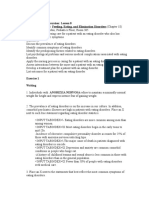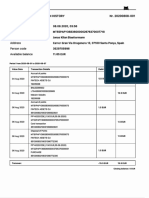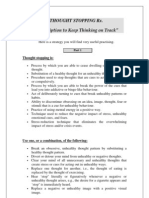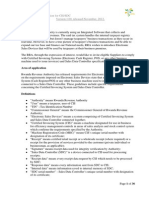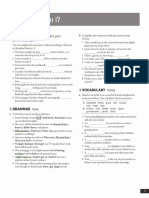Communication Errors and Skills - Partners
Communication Errors and Skills - Partners
Uploaded by
stafaCopyright:
Available Formats
Communication Errors and Skills - Partners
Communication Errors and Skills - Partners
Uploaded by
stafaCopyright
Available Formats
Share this document
Did you find this document useful?
Is this content inappropriate?
Copyright:
Available Formats
Communication Errors and Skills - Partners
Communication Errors and Skills - Partners
Uploaded by
stafaCopyright:
Available Formats
The Four Horsemen
Criticism Contempt
When criticizing: you say it is your partner you don’t Destructive to marriage = feeling disrespect, resentment
like “You did this, you always do this..” and hostility towards partner – discount the positive
Encourage complaint: describe behavior that you don’t Can be condescending humor
like: “I feel upset because, I noticed… I would like if we Cure = create appreciation within relationship
could…” Avoid using “always, never”
Defensiveness Stonewalling
Used when feeling attacked or treated unfairly When one person refuses to respond during argument or
Used with attempt to make situation better – but makes walks away to stop conflict = makes things worse
it worse Also done to avoid complaints = something bothers you
People say same thing over and over – saying “yes I but you decide not to say anything until it builds up
understand” can stop the argument Better to air complaints as they come up
Admit that you are wrong = take more responsibility in
relationship > 30% chance to be wrong
Think: “What have I done to contribute to this
argument?”
Basic communication skills
Avoid Harsh Start-ups Use repair attempts
The way a conversation starts is a predictor of how it Used to try to calm an argument when you see it is
will end (harsh tone, criticism etc.) getting out of control – when unable to avoid harsh start
Take a few moments to make sure it is a ups
positive start Use humor
Positive start up doesn’t feel good until Agree with some points partner makes
moments later Call a timeout until both are calmed down
Avoid blame Be clear and considerate
When discussing problems, avoid assigning blame When stating desires/goals
You’re always at least 30% responsible for a problem in Do not expect partner to know what you want /anticipate
a relationship your needs
Make more “I” statements Be considerate:
Ask for increase rather than decrease in behavior State more positives
Accept partial responsibility for problem Let partner know you are listening even if you
“Do you want to be right or do you want to be don’t agree
happy?” Reserve judgment, apologize and show
consideration for partner’s feelings when
expressing negatives
Be aware of tone of voice while arguing
Speaker
1. Observation – describe situation objectively: “When I see clothes on the floor”
2. Express feelings: “I feel anxious”
3. Express needs: “Because my need for order is not met”
4. Express request: “ I would like if you helped me clean up the house”
Listener
- Reflecting: Paraphrase or reflect what partner said in own words
- Validation: “I could see how you could feel that way” – doesn’t mean you agree
- Empathy: “That sounds really frustrating – I’m sorry you feel so frustrated”
- Problem solving: “What would you like me to do about this?”
The Seven Principles For Making Marriage Work
John M. Gottman
You might also like
- Recovery From InfidelityDocument5 pagesRecovery From InfidelityEllies Art StudioNo ratings yet
- Practice Test For SCATDocument4 pagesPractice Test For SCATmy name83% (6)
- Thought Record SheetDocument1 pageThought Record Sheetartlover30100% (1)
- Speech Outline SamplelDocument4 pagesSpeech Outline SamplelAna Karina AuadNo ratings yet
- Once Hurt, Twice Shy - Social Pain Contributes To Social AnxietyDocument9 pagesOnce Hurt, Twice Shy - Social Pain Contributes To Social AnxietyAndrés SánchezNo ratings yet
- Lesson 10 - Exercise 1 - Eating DisordersDocument3 pagesLesson 10 - Exercise 1 - Eating DisordersSam Wick33% (3)
- Keypad Prepayment Energy Meter and Vending System Solution 2014Document84 pagesKeypad Prepayment Energy Meter and Vending System Solution 2014Nguyễn Phi TriềuNo ratings yet
- BlackDocument2 pagesBlacksaxvdx100% (1)
- John Arthur Religion Morality and ConscienceDocument3 pagesJohn Arthur Religion Morality and ConsciencemartinNo ratings yet
- R2 B Relaxation LRDocument12 pagesR2 B Relaxation LRdavascanNo ratings yet
- Monthly+Download Win+Your+Relationship v2Document6 pagesMonthly+Download Win+Your+Relationship v2Ayşe NurNo ratings yet
- Building Healthy Relationships HandoutDocument4 pagesBuilding Healthy Relationships Handoutnicoletagr2744No ratings yet
- Love and Relationship AnalysisDocument6 pagesLove and Relationship Analysisalicia.cNo ratings yet
- Stress HealthDocument18 pagesStress HealthKelly YeowNo ratings yet
- Enneagram AnalysisDocument18 pagesEnneagram AnalysisHassan KhaterNo ratings yet
- Theory of EmotionDocument12 pagesTheory of EmotionBandanaa ShresthaNo ratings yet
- College Anxiety: How To Help An Anxious Student Transition SuccessfullyDocument5 pagesCollege Anxiety: How To Help An Anxious Student Transition SuccessfullybelbachirNo ratings yet
- Self Esteem PresentationDocument24 pagesSelf Esteem Presentationapi-285407825No ratings yet
- Life Stress Inventory PDFDocument1 pageLife Stress Inventory PDFmaimutze3No ratings yet
- ECR PyetesorDocument2 pagesECR PyetesorJuna BeqiriNo ratings yet
- Stress Is A Spice of Life - SamiDocument2 pagesStress Is A Spice of Life - SamiAreeb Anwar ShamsiNo ratings yet
- The Effects of Alcohol Addiction On Loved OnesDocument4 pagesThe Effects of Alcohol Addiction On Loved OnesSantosh ThapaNo ratings yet
- 03 SRH QuestionnairesDocument10 pages03 SRH QuestionnairesshwetaNo ratings yet
- Headache QuestionnaireDocument10 pagesHeadache QuestionnairePerisha VeeraNo ratings yet
- Natural Aromatase InhibitorsDocument3 pagesNatural Aromatase InhibitorsjbNo ratings yet
- Predicting Marital Happiness and Stability From NewlywedDocument19 pagesPredicting Marital Happiness and Stability From NewlywedrobinmessagNo ratings yet
- Conflict in Marriage: Implications For Working With Couples: Frank D. Fincham Steven R. H. BeachDocument31 pagesConflict in Marriage: Implications For Working With Couples: Frank D. Fincham Steven R. H. BeachjcmontelongoNo ratings yet
- 4 Causes of Family ConflictDocument1 page4 Causes of Family ConflictMa. Sharese Terania100% (1)
- Couples QuestionnaireDocument35 pagesCouples QuestionnaireAkanksha MehtaNo ratings yet
- DBSA WellnessWheel WS GoalPlannerDocument3 pagesDBSA WellnessWheel WS GoalPlannerСофія СмутчакNo ratings yet
- The Four Horsemen - The AntidotesDocument10 pagesThe Four Horsemen - The AntidotesMalu ArchividoNo ratings yet
- ARE QuestionnaireDocument1 pageARE QuestionnaireLORETO C100% (1)
- Couples Counseling PosterDocument1 pageCouples Counseling PosterSilvana de JesusNo ratings yet
- Panic Free Stage #3 PDFDocument11 pagesPanic Free Stage #3 PDFBeaNo ratings yet
- Steps To Yoga Nidra PracticeDocument1 pageSteps To Yoga Nidra Practiceeleni papageorgiouNo ratings yet
- How To Naturally Remove HeadacheDocument6 pagesHow To Naturally Remove HeadacheEmma KingNo ratings yet
- Three Types of Guilt Healthy GuiltDocument2 pagesThree Types of Guilt Healthy GuiltManish P. JadejaNo ratings yet
- Rewired+ +10+Elements+to+RecoveryDocument9 pagesRewired+ +10+Elements+to+Recoverysouvenirtje16No ratings yet
- Guiding Growth Best Parenting Tips For Nurturing Happy and Resilient ChildrenDocument34 pagesGuiding Growth Best Parenting Tips For Nurturing Happy and Resilient ChildrenapkahrconsultantNo ratings yet
- Nervous System Regulating Activities by UnyteDocument14 pagesNervous System Regulating Activities by UnytehellozenbokNo ratings yet
- The 4 Types of Ineffective ApologiesDocument5 pagesThe 4 Types of Ineffective ApologiesPushpendra Kumar SinghNo ratings yet
- Understanding Healthy Relationships PDFDocument10 pagesUnderstanding Healthy Relationships PDFBeatriz García MayordomoNo ratings yet
- COUN 603 Couples Practicum ReportDocument12 pagesCOUN 603 Couples Practicum ReportLynda A BarnesNo ratings yet
- DBT Emotional Regulation SkillsDocument8 pagesDBT Emotional Regulation SkillsRupali SharmaNo ratings yet
- Scott's Antidote 6 Page Instructions DevelopedDocument6 pagesScott's Antidote 6 Page Instructions Developedbagus918No ratings yet
- The Biochemistry of Love: An Oxytocin Hypothesis: C Sue Carter Stephen W PorgesDocument11 pagesThe Biochemistry of Love: An Oxytocin Hypothesis: C Sue Carter Stephen W PorgesFejlean Angelica AntineoNo ratings yet
- APA DSM5 Severity Measure For Generalized Anxiety Disorder Child Age 11 To 17Document3 pagesAPA DSM5 Severity Measure For Generalized Anxiety Disorder Child Age 11 To 17Anton Henry MiagaNo ratings yet
- Adolescence, Adulthood, Moral DVPT & Gender: AP Psych Review Video 6.4-6.7Document7 pagesAdolescence, Adulthood, Moral DVPT & Gender: AP Psych Review Video 6.4-6.7Jose G. matamorosNo ratings yet
- Methylene Blue and Light Therapy For Herpes SimplexDocument2 pagesMethylene Blue and Light Therapy For Herpes SimplexShane MendozaNo ratings yet
- Couples Therapy: The Relationship As The ClientDocument9 pagesCouples Therapy: The Relationship As The ClientImron Muzaki100% (2)
- How Successful People Set Boundaries at WorkDocument6 pagesHow Successful People Set Boundaries at WorkPhabloDiasNo ratings yet
- Investigation On Divorce - Life SkillsDocument27 pagesInvestigation On Divorce - Life SkillsKristian EspinalNo ratings yet
- Unhappy MarriageDocument5 pagesUnhappy MarriageEmma AnakwubaNo ratings yet
- Compassionate Systems Professional Growth ModelDocument3 pagesCompassionate Systems Professional Growth ModelDave SecombNo ratings yet
- An Open Letter To The Emergency Room Doctor That DidnDocument3 pagesAn Open Letter To The Emergency Room Doctor That Didnapi-356382313No ratings yet
- Guide To Blended FamiliesDocument7 pagesGuide To Blended FamiliesallieNo ratings yet
- Perceived Benefits and Costs of Romantic Relationships For Young People Differences by Adult Attachment Style PDFDocument19 pagesPerceived Benefits and Costs of Romantic Relationships For Young People Differences by Adult Attachment Style PDFValejahNo ratings yet
- Toxic Relationships: Toxic, Past Negative Experiences Can Become Ingrained in Our PsycheDocument6 pagesToxic Relationships: Toxic, Past Negative Experiences Can Become Ingrained in Our PsycheAntonieta HernandezNo ratings yet
- 4horsemen PDFDocument2 pages4horsemen PDFYusran FachryNo ratings yet
- Emotional ClarityDocument42 pagesEmotional ClarityJorj YasayNo ratings yet
- "Prescription To Keep Thinking On Track": Thought Stopping RXDocument3 pages"Prescription To Keep Thinking On Track": Thought Stopping RXsudesh215100% (1)
- 045 GottmanDocument7 pages045 GottmanDiana Teodora Pitei0% (1)
- The Infidelity Recovery Workbook: A 90-Day Couple's Journey to Rebuild, Redefine, and Reignite Your RelationshipFrom EverandThe Infidelity Recovery Workbook: A 90-Day Couple's Journey to Rebuild, Redefine, and Reignite Your RelationshipNo ratings yet
- Datatreasury Corporation v. Wells Fargo & Company Et Al - Document No. 338Document2 pagesDatatreasury Corporation v. Wells Fargo & Company Et Al - Document No. 338Justia.comNo ratings yet
- Hedging With Foreign Currency Futures at Transcend IncDocument5 pagesHedging With Foreign Currency Futures at Transcend IncYuyun Purwita SariNo ratings yet
- Concerns Based ModelDocument19 pagesConcerns Based ModelObejero CharbzNo ratings yet
- Technical Specification Ver1Document36 pagesTechnical Specification Ver1Tommy Kyen'de BilNo ratings yet
- Psychological Mechanism of The Speech ProcessDocument14 pagesPsychological Mechanism of The Speech ProcessMariia BilovodNo ratings yet
- Application For Waiver of DefenceDocument5 pagesApplication For Waiver of DefenceSyed Kamran AliNo ratings yet
- Workbook 1B PDFDocument3 pagesWorkbook 1B PDFJoel A. Mamani CarrilloNo ratings yet
- Soc SciDocument7 pagesSoc SciKristhel Pecolados Rombaoa100% (1)
- Form Factor For 9 Tree SpeciesDocument8 pagesForm Factor For 9 Tree SpeciesZelalem TadeleNo ratings yet
- Bab 3 - Pengajian MalaysiaDocument12 pagesBab 3 - Pengajian MalaysiaFadhlin SakinahNo ratings yet
- Psychology ReviewerDocument18 pagesPsychology ReviewerTiffany CaballeroNo ratings yet
- Well HydraulicsDocument25 pagesWell HydraulicsFArzand E Gul100% (1)
- The Insider - Movie Review From The Perspective of Business EthicsDocument2 pagesThe Insider - Movie Review From The Perspective of Business EthicslksgluceNo ratings yet
- The Effectiveness of Mass Media Campaigns: Youth Substance AbuseDocument30 pagesThe Effectiveness of Mass Media Campaigns: Youth Substance AbuseKarina YesikaNo ratings yet
- Bililux Pi 9103535 en Master 1801 3Document10 pagesBililux Pi 9103535 en Master 1801 3Richard CarrancejaNo ratings yet
- SACAC ProspectusDocument36 pagesSACAC Prospectussarah goswami0% (1)
- Anglais Bac C D 2012Document4 pagesAnglais Bac C D 2012eviwounoukingNo ratings yet
- Notes For C++Document40 pagesNotes For C++gamej8158No ratings yet
- Product Lifecycle Management BasicsDocument13 pagesProduct Lifecycle Management BasicsRaviteja Vga100% (1)
- Trombone Recital NotesDocument7 pagesTrombone Recital Notesapi-328729151No ratings yet
- Act SX Afecta El Rendimiento DeportivoDocument8 pagesAct SX Afecta El Rendimiento DeportivoPablo ParicahuaNo ratings yet
- The Three TreasuresDocument9 pagesThe Three TreasuresDeepak BiswasNo ratings yet
- Bottling SPCDocument6 pagesBottling SPCAINUL AWATIF BINTI DAMANHURI MEM211065No ratings yet
- Analytical Method Development and Validation For The Simultaneous Estimation of Ofloxacin and Metronidazole in Bulk and Dosage Form Using RP-HPLCDocument12 pagesAnalytical Method Development and Validation For The Simultaneous Estimation of Ofloxacin and Metronidazole in Bulk and Dosage Form Using RP-HPLCBaru Chandrasekhar RaoNo ratings yet
- Christmas Day Sermon in EnglishDocument13 pagesChristmas Day Sermon in EnglishSandeep MenezesNo ratings yet
- Education British English TeacherDocument4 pagesEducation British English TeacherAlice FewingsNo ratings yet





